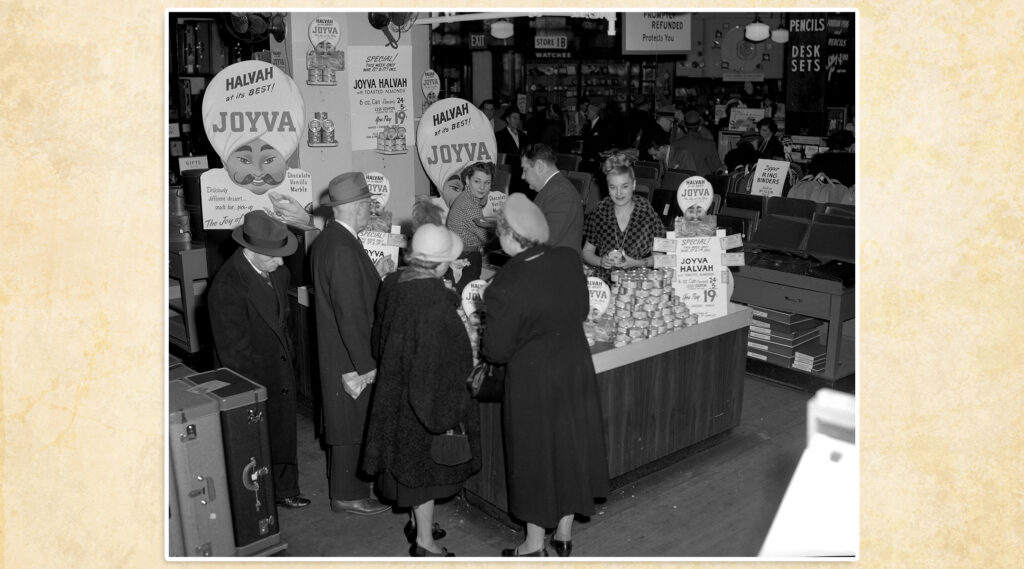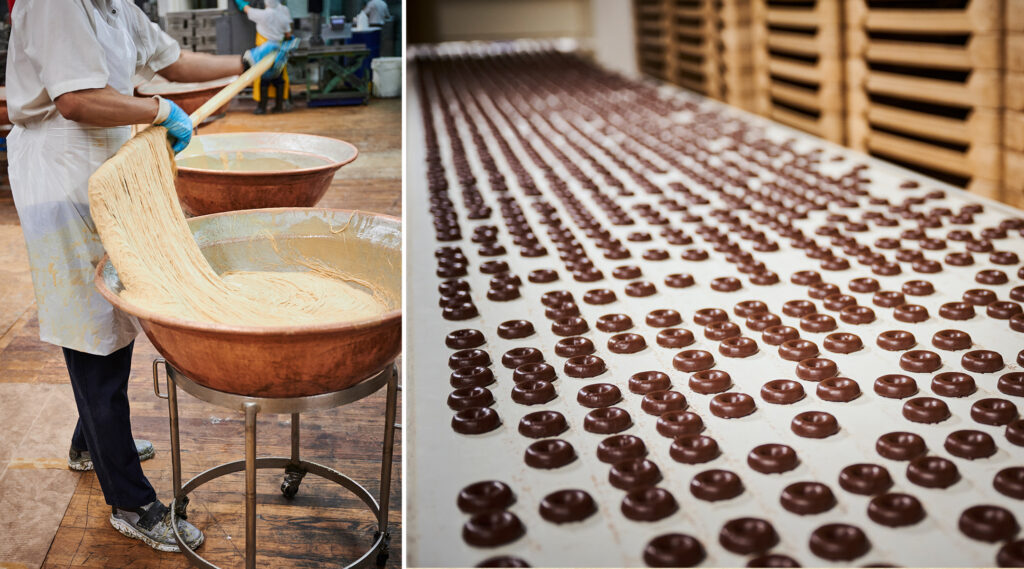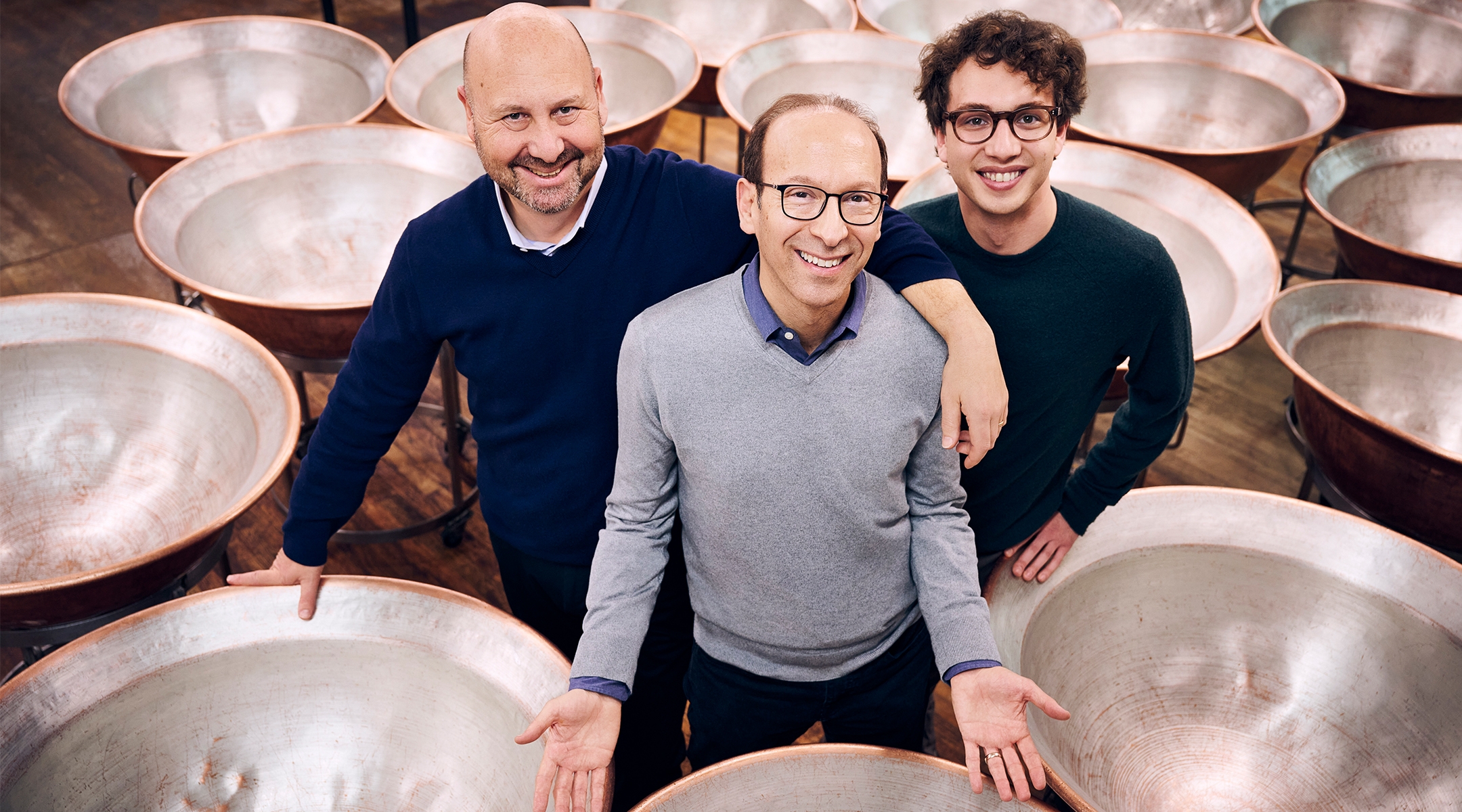Joyva, the fourth-generation family-owned kosher candy company, has come a long way since it was first launched in 1907 as a pushcart on the Lower East Side.
It was then that Nathan Radutzky, a Jewish immigrant from Kyiv, began selling homemade halvah, the sweet sesame confection, along with other treats under the name Independent Halvah and Candies. Soon Radutzky and his wife, Ray, opened a small storefront in the neighborhood on Orchard Street before moving to its current digs at 53 Varick Avenue in Bushwick in 1931.
The company renamed itself Joyva — a portmanteau of “joy” and its signature product, halvah — in 1951 and has remained in its 40,000-square-foot Brooklyn factory ever since.
Now a company long associated with iconic Passover candies and other year-round treats is undergoing a rebrand — tweaking its packaging, eliminating artificial ingredients and aiming to attract a new generation of customers by calling attention to the company’s deep Brooklyn roots.
Cautiously steering these updates of the 117-year-old business are Richard Radutzky, Nathan’s 61-year-old grandson, and Sandy Wiener, Nathan’s 59-year-old great-grandson and Richard’s cousin.
“How can we make this company a little bit more contemporary and do something to make it bigger, better, more accessible, a little less stale and a little less old, without giving up what is beautiful about being old, which is a classic, nostalgic, trustworthy legacy?” Radutzky said.
During a visit to the factory last month by the New York Jewish Week, dozens of Joyva’s 60 employees were busy mixing the ingredients for the brand’s sugary marshmallows — which are molded and coated in layers of chocolate to become Marshmallow Twists — while others stirred tons of creamy, nutty tahini in industrial-sized copper kettles before adding in corn syrup to create halvah.

Joyva selling its signature halvah in 1951. (Courtesy Joyva)
While the company’s name and methods of production may be much the same as they were in the 1960s — when they began manufacturing their iconic Jell Rings, a jelly candy coated in dark chocolate — some things have changed over the generations.
These days, Joyva’s candies are available in single-serving packs at bagel shops, bodegas and the like, and this month they’re collaborating with Zucker’s Bagels on a pistachio halvah cream cheese. They’re also bringing their wares to scene-y Jewish events, like the recent launch party of the “Old Jewish Men” guidebook. In the spring, they hosted 100 influencers and artists for a pop-up Passover seder in their warehouse in partnership with Shtick NYC.
The current generation of owners joined Joyva in the late 1980s, learning from Nathan’s sons Alex, Harry, Max and Milton, what it meant to work with family — a Jewish family, in particular. “It was beautiful,” Radutzky told the New York Jewish Week, sitting beneath a portrait of the family patriarch that has hung in Joyva’s main office for decades. “They looked out for each other. It was that sort of ‘all for one, one for all’ thing.”
“My father, my uncles, helped build a yeshiva in Crown Heights, and they were on the board of [Brooklyn’s] Brookdale Hospital and individually active in their synagogues,” Radutzky said.
Over the decades, Joyva’s kosher candies have become an essential element at simchas, holidays and Jewish family gatherings — especially Passover seders. Though Joyva’s candies are certified kosher-for-Passover year-round, every year they kasher the factory ahead of the holiday under a rabbi’s supervision.
Passover is Joyva’s peak season: About 200 million Jell Rings and 75 million Marshmallow Twists are sold for the holiday, which is just about half of the company’s yearly output. Before the company came to dominate the Passover market in the 1960s, Passover was seen as a “retail consumer holiday that lacked a certain amount of draw,” Radutzky explained. “It was matzah, gefilte fish and crappy candy.”
The candies were also considered a treat at a time when the restrictions of Passover — no leavened products, restricted use of flour — made cakes and cookies less appealing desserts.
Over the years, the Passover and year-round kosher market boomed, and competitors filled store aisles with new snack foods, desserts and candies. When Richard Radutzky’s father, Milton, the youngest and last surviving of the four brothers, died in 2015 at age 93, Richard and Wiener were faced with the challenge of modernizing a century-old family business.
Radutzky said he felt both a “freedom” to take on the company, as well as a “responsibility.” Before the rebrand, Joyva sales were plateauing in the face of hip startup sesame brands like Soom and Seed + Mill.
Enter Benjamin Radutzky, Richard’s 30-year-old son, who joined the business in 2019. As the director of strategic development, his aim was to bring a “millennial touch” to the business — developing the website, tracking operations on Excel and “anything on a computer,” he said.

A worker at the Joyva factory mixes a batch of candy filling; at right, the company’s signature Jell Rings. (Courtesy Joyva)
Joining the company was not something Benjamin had planned to do, but after a few unfulfilling branding jobs after college he had a change of heart. “I just thought, this company is the reason I am where I am today — it’s the foundation of my entire family going back 117 years,” he told the New York Jewish Week. “It just dawned on me that it was an exciting opportunity to be a part of that web of familial history.
“It’s an absolute joy, and I’m excited to be part of the thing that facilitated so many hide-and-seek games in my youth, in the warehouse,” he added. “It was a playground that then became a workplace.”
In 2023, Joyva unveiled its rebrand, which included doing away with its sultan logo, which it had used since the 1950s. Instead there’s a simple, bow-shaped logo reading “Joyva, Brooklyn 1907,” and boxes are decorated with whimsical shapes and patterns that resemble the candy inside. Also gone are artificial colors and flavors.
“It was a real challenge for us in the last couple of years to refresh ourselves — everything from new packaging and new design to how we live in the world,” Radutzky said. “It’s been incredibly fun and cool and challenging.”
The goal, he said, was to communicate the core of what the family believes Joyva represents: family, tradition, love, nostalgia and celebration.
“A lot of brands write down their values and then try to live them. We were a little bit of the opposite,” said Farrah Bezner, the chief marketing officer who, in 2020, became the first non-family member to join Joyva’s management team. “We had survived up until now, by word of mouth, generation to generation, being on people’s tables. But there wasn’t really any marketing to be had.”
Despite these recent nods to modernity, Radutzky insists that the company maintains true to the Jewish values it’s held since the beginning. “We have always firmly rooted ourselves in tradition and the values of Judaism,” he said. “Our values are family and tradition, doing the right thing, respect and enjoying the ride.”
The New York Jewish Week brings you the stories behind the headlines, keeping you connected to Jewish life in New York. Help sustain the reporting you trust by donating today.





